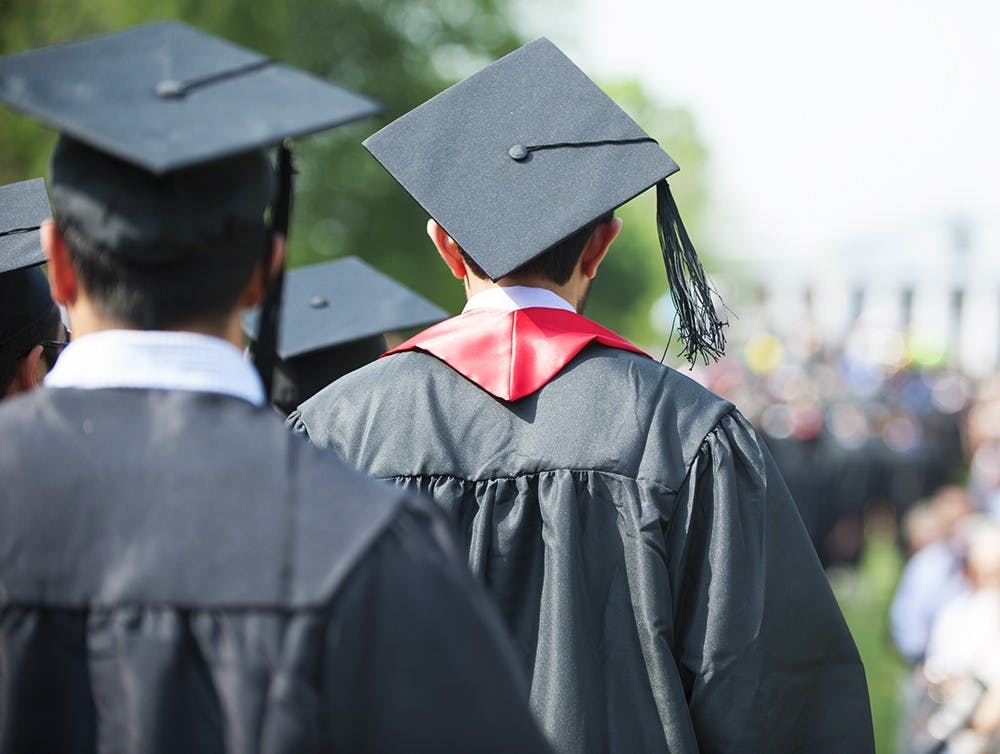The University finalized a policy this summer concerning protests and demonstrations held during Finals Weekend, and a local civil liberties organization says the policy may pose a threat to free speech.
“There are aspects of the Finals Weekend regulation that are entirely too vague and overbroad and thus pose a threat to basic First Amendment freedoms,” John Whitehead, a constitutional attorney and president of The Rutherford Institute, said in a memorandum obtained Thursday by The Cavalier Daily.
The policy, entitled “SEC-039: Protests, Demonstrations and Other Expressive Activities during Finals Weekend,” restricts public demonstrations during Finals Weekend — which includes Valedictory and Final Exercises — to the open area between McCormick Road on one side and Peabody Hall and the Special Collections Library on the other.
The policy also prohibits the use of sound amplification devices and temporary structures, such as tents.
The policy notes attendance at Finals Weekend events is by invitation only, and those without invitation may be asked to leave. Non-University commercial solicitation, including advertising and fundraising, are not permitted on Grounds during Finals Weekend.
“The University of Virginia respects and encourages free expressive activity by its students, faculty, and staff,” the reason for the policy states. “At the same time, consistent with its educational mission, the University has established reasonable time, place and manner restrictions on such activities on University Grounds to assure that such activities are undertaken in ways that avoid disruption of University operations, and are consistent with its educational, employment and safety responsibilities to its students, faculty and staff.”
Pam Higgins, the University’s Executive Director of Major Events, said this is a longstanding policy that was merely formalized on July 20.
“This policy, which had been in place for decades, was updated this spring,” Higgins said in a statement. “The Policy Review Committee formally reviewed and approved it for inclusion in the University Policy Directory this summer."
University Deputy Spokesperson Matt Charles said the updates to the policy served two purposes: to clarify who is authorized to enforce the policy and to clearly define what is meant by “Finals Weekend” and “Final Exercises.”
Charles also said the updates were made based on suggestions from the Policy Review Committee.
“The policy continues to ensure the safety and well-being of the University community and the thousands of family and friends that visit Grounds during Finals Weekend,” Charles said. “This policy also provides spaces for protests, demonstrations and other expressive activities during Finals Weekends for both the fair and inclement weather plans.”
Whitehead, however, said he feels a glaring problem with the policy is the vague language it uses.
“The policy states that ‘activities that otherwise may be consistent with University policy may be impermissible during’ Finals Weekend,’” Whitehead said. “However, there is no standard to guide university officials to determine what is ‘impermissible’ during Finals Weekend, thus allowing them to exercise viewpoint discrimination in determining which expressive activities to allow and which to ban.”
Whitehead also questioned a part of the policy prohibiting visitors and participants from interfering with Finals Weekend events and activities.
“Again, there is no standard to determine interference,” Whitehead said. “Does a rousing ‘hurrah’ offered by elated parents upon diploma presentation constitute interference?”
Whitehead also took issue with restrictions on where protests can occur, noting that the policy applies to the entirety of the weekend.
“Even if there is a reason to forbid demonstrations and protests at certain places on campus at certain times — such as the Lawn during graduation — to forbid expressive activity in all non-designated places at all times — even when crowds might not be large — during Finals Weekend fails to tailor the restriction to the goals of the University,” he wrote.
Whitehead also commented on the process of ejecting policy violators.
“While the policy allows a representative to ask the person to cease the conduct at issue, the plain terms of the policy allow the [University] representative to eject the person without a demand or warning,” he said. “The policy also allows for the arrest of a person who does not comply with a request, but it is unclear what offense a person who violates the policy might have committed which justifies an arrest.”
According to Whitehead’s memorandum, the policy goes against the ideals central to the mission of a university.
“The purpose of a university is to provide an atmosphere that is conducive to free thought and free interchange of ideas, even controversial ones,” he said. “This policy wrongly sacrifices those goals in the misguided attempt to assure serenity during Finals Weekend.”
The University’s website says this policy is not scheduled for review until July 2019.
The Cavalier Daily reached out to the University for comment about The Rutherford Institute’s concerns about the policy Thursday afternoon, but did not receive a response by press time. This article will be updated upon receiving a response.







